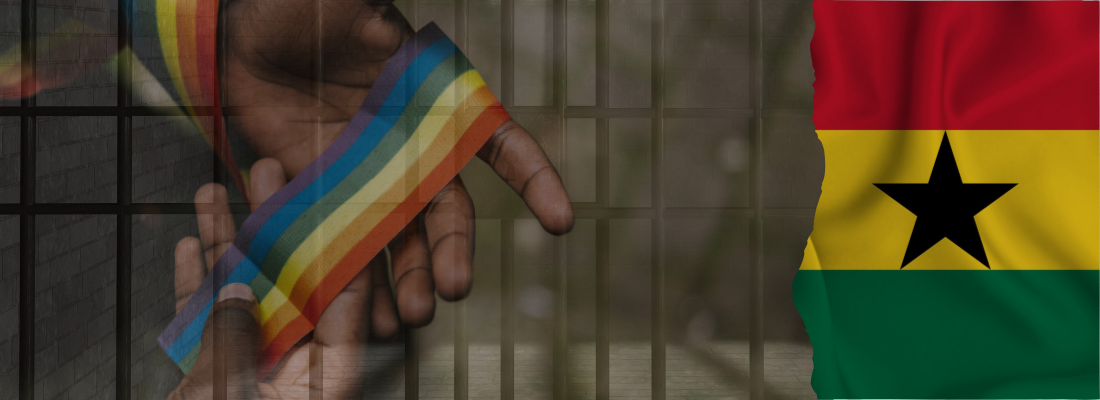Ghana: IBAHRI calls on President Akufo-Addo to repeal discriminatory LGBTQ+ Bill
Friday 5 April 2024

The International Bar Association’s Human Rights Institute (IBAHRI) is deeply concerned by the bill passed by Ghana’s Parliament in what is widely seen as further criminalisation of the lesbian, gay, bisexual, transgender, intersex, queer/questioning and other (LGBTQ+) communities in the West African country. The IBAHRI calls on Ghana’s President Akufo-Addo not to sign the bill into law.
The IBAHRI regards The Proper Human Sexual Rights and Ghanaian Family Values Bill (the Bill) as a major setback for human rights in Ghana. People identifying as LGBTQ+ could be punished with up to three years’ imprisonment. It further imposes a maximum five-year jail term for anyone forming or funding LGBTQ+ groups, as well as up to ten years’ imprisonment for anyone involved in LGBTQ+ advocacy campaigns aimed at children.
IBAHRI Co-Chair and Immediate Past Secretary General of the Swedish Bar Association, Anne Ramberg Dr Jur hc, commented: ‘The passage of this Bill by the Parliament of Ghana only serves to increase and incite animosity, and to promote prejudice, towards LGBTQ+ citizens of Ghana. By reinforcing draconian colonial-era laws against the long-fought for rights and freedoms of the LGBTQ+ communities is to entirely set aside decades of advancements in international law, including the International Covenant on Civil and Political Rights, the African Charter and the Yogyakarta Principles.’
The Bill, one of the harshest of its kind in Africa, must still be validated by President Nana Akufo-Addo before entering into law, which observers believe is unlikely before a general election in December 2024. The Finance Ministry is reported to have warned that Ghana could lose a total of $3.8bn (£3bn) in World Bank funding over the next five to six years if the Bill is signed into law. Therefore, on the advice of the Finance Ministry, President Akufo-Addo has said he will defer assent to the Bill until the Supreme Court of Ghana rules on its constitutionality.
However, such broad legislation that is discriminatory in its nature has already prima facie failed to pass the muster of the constitution and international instruments, risking further erosion of the rule of law.
The United Nations High Commissioner for Human Rights, Volker Türk, expressed deep alarm that the Bill criminalises the legitimate work of human rights defenders, teachers, medical professionals and landlords, as well as people seeking healthcare, and unduly restricts freedom of association and expression of everyone in Ghana.
IBAHRI Director, Baroness Helena Kennedy KC, stated: ‘The anti-LGBTQ+ Bill serves to not only threaten the basic human rights of members of the LGBTQ+ community, but will have a pervasive ripple effect in diminishing human rights protection across Ghanian society. Considering Ghana’s recent election to the Human Rights Council, the adoption of the Bill would directly conflict with Ghana’s commitment at the Human Rights Council to respecting and protecting the rights of all individuals, regardless of their sexual orientation or gender identity, further endangering the right to health, housing and freedom of association and other interrelated rights. We urge the President to repeal this Bill.’
IBAHRI Co-Chair, Mark Stephens CBE, stated: ‘The anti-LGBTQ+ Bill will have severe ramifications on the legal profession in Ghana as those lawyers who seek to defend persons identified as queer will themselves be targeted. This is in direct contradiction of the UN Guiding Principles on the Role of Lawyers which states that lawyers shall not be identified with their clients or their clients' causes as a result of discharging their functions. We urge Ghana to retain the character of its legal profession as free and independent.’
Last June, similar legislation that criminalised homosexuality was passed in Uganda. Although other African countries have criminalised homosexual acts under sodomy laws, the legislation of Ghana and Uganda specifically criminalises anyone identifying as LGBTQ+ regardless of their activity. In contrast, other African countries have decriminalised consensual same-sex relationships in recent years, such as Botswana’s Court of Appeal, which unanimously repealed anti-homosexuality laws, stating in its ruling that ‘Those sections [of the penal code] have outlived their usefulness, and serve only to incentivise law enforcement agents to become keyhole peepers and intruders into the private space of citizens.’
The IBAHRI calls on the Ghanaian government to reconsider the widespread, unjust and discriminatory outcomes that this Bill will have if it comes into effect and urges its unequivocal repeal.
ENDS
Contact: IBAHRI@int-bar.org
Notes to the Editor
- Related material:
-
The International Bar Association’s Human Rights Institute (IBAHRI), established in 1995 under Founding Honorary President Nelson Mandela, is an autonomous and financially independent entity, working to promote, protect and enforce human rights under a just rule of law, and to preserve the independence of the judiciary and the legal profession worldwide.
- Find the IBAHRI on social media here:
-
The International Bar Association (IBA), the global voice of the legal profession, is the foremost organisation for international legal practitioners, bar associations and law societies. Established in 1947, shortly after the creation of the United Nations, it was born out of the conviction that an organisation made up of the world's bar associations could contribute to global stability and peace through the administration of justice.
- Find the IBA on social media here:
Website page link for this news release:
Short link: www.tinyurl.com/yyy327cp
Full link: www.ibanet.org/Ghana-IBAHRI-calls-on-President-Akufo-Addo-to-repeal-discriminatory-LGBTQ-Bill
